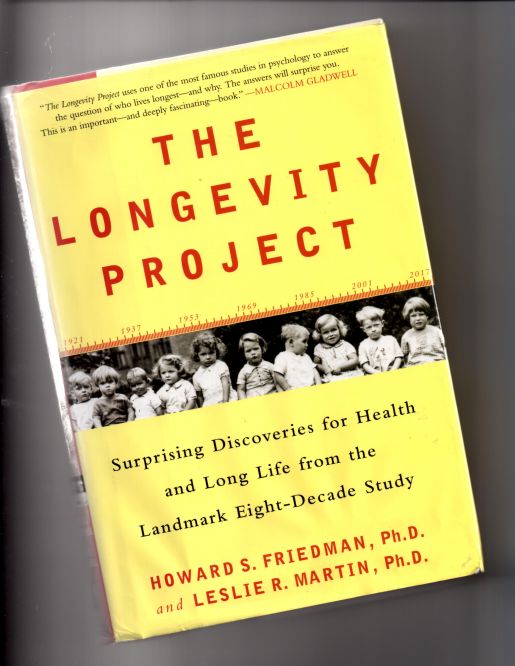You might also be interested in...
-
Abilities Expo puts people on the move
11/19/2012
-
American Home: New but not 'friendly'
03/24/2013
-
Book Review: The Accessible Home
05/31/2013
-
Book review: The Longevity Project
06/08/2011
-
Book review: The Roadmap to 100
06/01/2011
-
Book review: Unassisted Living
12/31/2013
-
Brick & mortar aging in place shop: Beverly's Daughter, Seattle
09/10/2013
-
House review: New American Home
07/30/2012
-
Product overview: User-friendly designs
09/09/2011
-
Product review: Easy chairs
02/15/2012
Book review: The Longevity Project
Posted: 06/08/2011
By: Lynette Evans
Everyone wants to live a long life, but nobody knows for sure how to go about making that happen. Mostly, researchers have asked centenarians their secrets to longevity, and the answers have varied from "never smoked" to "drank a glass of beer every day." But, as any scientist will tell you, anecdotal evidence is just that -- anecdotal -- and that daily glass of beer may have had no influence on the magic 100th birthday.
 Now comes "The Longevity Project: Surprising Discoveries for Health and Long Life from the Landmark Eight-Decade Study" by Howard S. Friedman, Ph.D. and Leslie R. Martin, Ph.D. (Hudson Street Press, 2011). Drs. Friedman and Martin and a score of research collaborators have pored over data collected on the lives of more than 1,500 people over 80 years.
Now comes "The Longevity Project: Surprising Discoveries for Health and Long Life from the Landmark Eight-Decade Study" by Howard S. Friedman, Ph.D. and Leslie R. Martin, Ph.D. (Hudson Street Press, 2011). Drs. Friedman and Martin and a score of research collaborators have pored over data collected on the lives of more than 1,500 people over 80 years.
In 1921, Stanford University psychologist Dr. Lewis Terman began studying 1,528 bright, middle-class 10-year-olds. By following these children as they grew up, married (or didn't), went off to war, began careers and reached middle age, he was hoping to find the sources of intellectual leadership. Dr. Terman's associates continued to survey the group for many years after his death in 1956, and it is the data gathered over all the decades of comprehensive questioning, as well as their own research into death records and interviews with surviving members of the group toward the end of the 20th Century, that Friedman and Martin used to form conclusions about the traits and lifestyles that lead to long life. (The homogeneity of the group -- all bright middle-class children -- and the long timeline gave Friedman and Martin the built-in control and comparison groups required to perform sound scientific research.)
Prudence pays
From comparing the lives, habits and personality traits of those who lived long lives with those who died early, Friedman and Martin concluded that longevity belongs to the conscientious and prudent. "The young adults who were thrifty, persistent, detail oriented, and responsible lived the longest." By century's end, "71 percent of the Terman men and 51 percent of the Terman women had died. It was the unconscientious among them who had been dying in especially large numbers."
While it may not be surprising that imprudent people are more likely to be risk-takers, drinkers or smokers, conscientiousness and, in men, a bit of worrying actually lead to longer life, while cheerfulness and optimism could have the opposite effect. Healthy people may be happier, the authors conclude, but happiness does not cause health. Likewise, pets may make you happy, but they don't make you live longer. On the other hand, cultivating your feminine side (for both women and men) and having a strong social network does.
Bringing the study home
"The Longevity Project" is not a diet or self-help book (why it is shelved with diets in some bookstores is beyond me), although the authors do provide numerous sample quizzes for readers to test their own proclivities against those of the Terman subjects. The 15 chapters detail the various traits Friedman and Martin found relevant to longevity and what led them to their conclusions. They close most chapters with a section called "What It Means for You: Guideposts to Health and Long Life." This last is helpful, but their use of pseudonyms for Terman participants, though understandable for privacy reasons, is maddening for a reader trying to separate the traits that helped "James" lead a long life from those that killed "Donna" off early.
Friedman's and Martin's conclusions about longevity are relevant not only for individuals, but as they explain in the Epilogue, for society as well. "Our studies suggest that a society with more conscientious and goal-oriented citizens, well integrated into their communities, is likely to be a society of health and long life." Hear, hear.
Useful Resources: